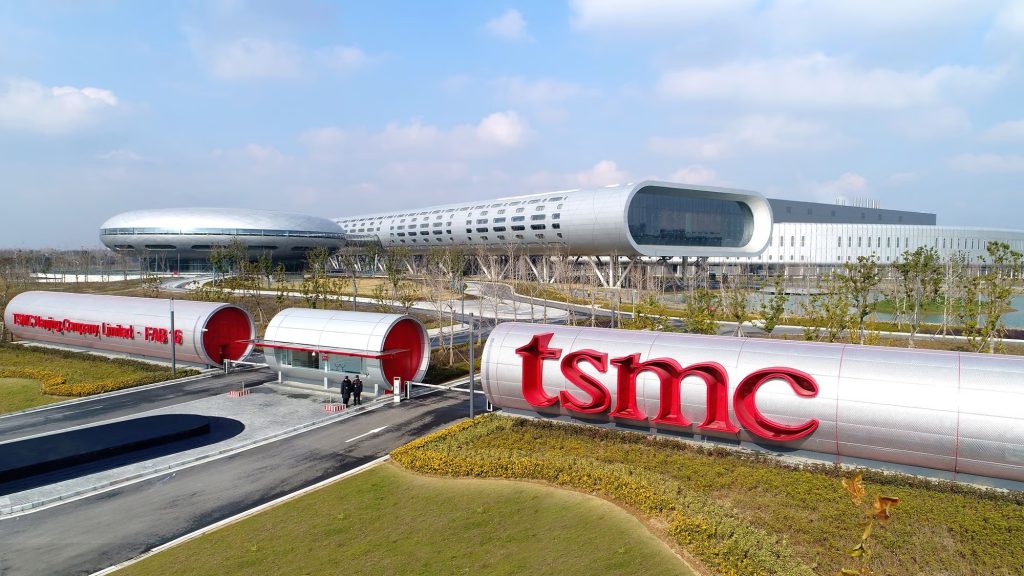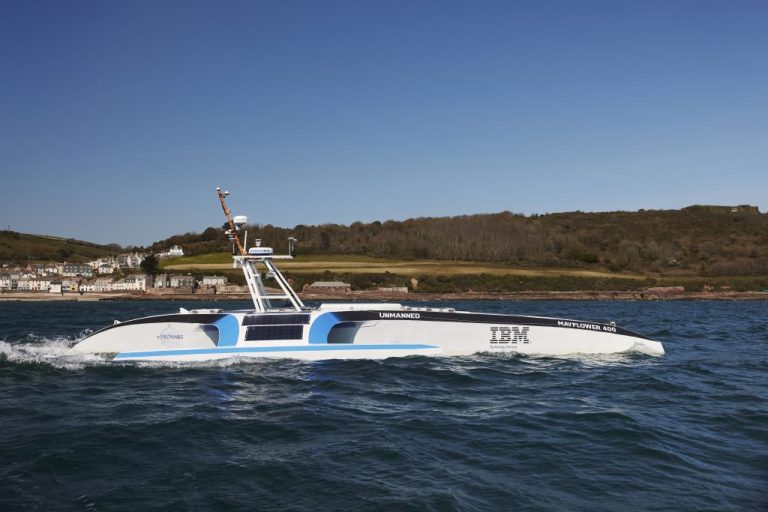TSMC Sees Soaring AI Chip Demand Despite Trump Tariff Challenges
TSMC Reports Record AI Chip Demand Amid Tariff Uncertainty
The Taiwan Semiconductor Manufacturing Company (TSMC) finds itself navigating a tumultuous landscape marked by unparalleled demand for AI chips, escalating trade tensions, and geopolitical risks that threaten the stability of global semiconductor supply chains. During TSMC’s annual shareholders meeting in Hsinchu, CEO C.C. Wei expressed optimism, stating, “our revenue and profit this year will set new historical highs.”
This positive outlook comes as TSMC deals with indirect consequences of U.S. tariffs while simultaneously striving to meet the extraordinary demand for AI applications.
Managing Tariff Impacts
Wei addressed rising concerns regarding the effects of President Trump’s trade policies on the semiconductor industry, noting that while tariffs do have an impact on TSMC, they do not affect the company directly. He clarified, “Tariffs are imposed on importers, not exporters. TSMC is an exporter.” However, he acknowledged that higher tariffs may lead to increased prices, which could subsequently dampen demand.
Despite potential challenges, Wei assured shareholders that TSMC’s strong position would endure. “Our business will still be very good,” he asserted, expressing more concern over a potential decline in the global economy rather than trade issues.
Surges in AI Demand
Despite these trade-related hurdles, TSMC continues to benefit from booming demand for AI applications. Wei observed that AI chip demand remains “very strong” and often exceeds the company’s production capacity. “Our job is to provide our customers with enough chips, and we’re working hard on that,” he stated, reiterating the challenges posed by the scale of demand.
With clients like Apple and Nvidia contributing significantly to this AI-driven semiconductor surge, TSMC reported impressive April sales figures of NT$349.6 billion ($11.6 billion), marking a 48.1% increase year-over-year and a 22.2% rise from March. Wei highlighted that much of this growth was due to companies stockpiling semiconductors in anticipation of future tariff increases while stressing the inherent strength of AI demand fundamentals.
Challenges in Expanding Production Capacity
The growing disparity between the demand for AI chips and the available supply presents a major challenge for TSMC. Wei confirmed that the company is actively seeking to enhance production capacity but noted that the overwhelming demand continues to strain even the most advanced semiconductor manufacturing capabilities worldwide.
Geopolitical Pressures and Expansion Plans
TSMC is under increasing pressure to diversify its manufacturing operations beyond Taiwan, where most of its fabrication plants are situated. The ongoing claims made by Beijing over Taiwan, alongside threats of force, raise significant concerns regarding the resilience of the supply chain essential for semiconductor production.
Addressing recent speculation regarding potential expansions into the Middle East, Wei firmly refuted rumors about TSMC contemplating chip factories in the United Arab Emirates. “I think rumors are really flying everywhere,” he remarked, dismissing reports from Bloomberg citing unnamed sources. The company has instead focused on establishing its presence in various regions, with facilities currently in development in the United States, Europe, and Japan.
TSMC aims to mitigate geopolitical risks while addressing customer needs for geographically diversified supply chains. The company’s operations continue to adapt to intricate regulatory demands across various jurisdictions. Wei emphasized that TSMC collaborates closely with both the Taiwanese and U.S. governments to meet legal and regulatory standards. Recently, the company halted shipments to the China-based chip designer Sophgo after identifying that its chip components resembled those in Huawei Technologies’ AI processors, which are subject to extensive U.S. government restrictions. This situation underscores the ongoing difficulties TSMC faces in juggling commercial relationships with regulatory compliance.
Looking ahead, while TSMC’s short-term outlook appears promising, Wei acknowledged broader economic concerns that could influence the semiconductor sector. His comments reflect a recognition that overall global demand trends are critical to the industry’s success, indicating a personal apprehension about economic downturns rather than specific trade policies. TSMC’s ambitious performance forecasts suggest that the current strong demand for AI chips could counterbalance potential challenges stemming from trade policies or general economic uncertainty. However, the longevity of this growth is likely contingent on the continued evolution of AI applications and the overall vitality of the global economy.
Explore further insights into AI and big data from industry leaders at upcoming events like the AI & Big Data Expo, taking place in Amsterdam, California, and London. This comprehensive event will be co-located with other significant gatherings, such as the Intelligent Automation Conference, BlockX, Digital Transformation Week, and Cyber Security & Cloud Expo.
On June 9, 2025, the UK is addressing the skills gap in artificial intelligence (AI) through a strategic partnership with NVIDIA. This collaboration aims to equip the workforce with the necessary skills to thrive in an increasingly AI-driven economy.
The initiative focuses on enhancing educational resources and training programs, ensuring that future professionals are well-prepared to meet the demands of the tech industry. By leveraging NVIDIA’s expertise in AI and machine learning, the UK aims to foster innovation and maintain its competitive edge in technology.
This partnership is seen as a crucial step towards building a robust ecosystem that not only enhances the capabilities of individuals but also supports the growth of the national economy. As the landscape of technology evolves, adapting educational frameworks will be vital for success in the global market.
Artificial Intelligence, Enterprise
June 10, 2025
OpenAI’s Second Largest Paying Market Opens New Office in South Korea
OpenAI is expanding its global presence with the establishment of a new office in South Korea, marking a significant step for the company in one of its largest markets. This move aims to strengthen its operations and cater to the growing demand for AI technologies in the region.
Artificial Intelligence, Companies
June 9, 2025
UK Addresses AI Skills Gap through NVIDIA Partnership
The UK government is tackling the AI skills shortage by partnering with NVIDIA, a leader in graphics processing units and AI solutions. This collaboration seeks to enhance the workforce’s expertise in artificial intelligence, ensuring that the nation remains competitive in the global tech landscape.
Applications, Artificial Intelligence
June 6, 2025
Anthropic Unveils Claude AI Models for U.S. National Security
In a bid to bolster national security, Anthropic has launched its latest AI models, named Claude. These advancements in artificial intelligence aim to enhance various security measures, reflecting the increasing integration of AI technologies in governmental operations and safety protocols.
Subscribe
Receive our premium content and the latest updates in technology directly in your inbox.
The following is a comprehensive list of countries and regions:
Kingdom of United States, Afghanistan, Albania, Algeria, American Samoa, Andorra, Angola, Anguilla, Antarctica, Antigua and Barbuda, Argentina, Armenia, Aruba, Australia, Austria, Azerbaijan, Bahamas, Bahrain, Bangladesh, Barbados, Belarus, Belgium, Belize, Benin, Bermuda, Bhutan, Bolivia, Bonaire, Sint Eustatius and Saba, Bosnia and Herzegovina, Botswana, Bouvet Island, Brazil, British Indian Ocean Territory, Brunei Darussalam, Bulgaria, Burkina Faso, Burundi, Cambodia, Cameroon, Canada, Cape Verde, Cayman Islands, Central African Republic, Chad, Chile, China, Christmas Island, Cocos Islands, Colombia, Comoros, Congo, Democratic Republic of the Congo, Cook Islands, Costa Rica, Croatia, Cuba, Curaçao, Cyprus, Czechia, Côte d’Ivoire, Denmark, Djibouti, Dominica, Dominican Republic, Ecuador, Egypt, El Salvador, Equatorial Guinea, Eritrea, Estonia, Eswatini, Ethiopia, Falkland Islands, Faroe Islands, Fiji, Finland, France, French Guiana, French Polynesia, French Southern Territories, Gabon, Gambia, Georgia, Germany, Ghana, Gibraltar, Greece, Greenland, Grenada, Guadeloupe, Guam, Guatemala, Guernsey, Guinea, Guinea-Bissau, Guyana, Haiti, Heard Island and McDonald Islands, Holy See, Honduras, Hong Kong, Hungary, Iceland, India, Indonesia, Iran, Iraq, Ireland, Isle of Man, Israel, Italy, Jamaica, Japan, Jersey, Jordan, Kazakhstan, Kenya, Kiribati, Korea (North), Korea (South), Kuwait, Kyrgyzstan, Lao People’s Democratic Republic, Latvia, Lebanon, Lesotho, Liberia, Libya, Liechtenstein, Lithuania, Luxembourg, Macao, Madagascar, Malawi, Malaysia, Maldives, Mali, Malta, Marshall Islands, Martinique, Mauritania, Mauritius, Mayotte, Mexico, Micronesia, Moldova, Monaco, Mongolia, Montenegro, Montserrat, Morocco, Mozambique, Myanmar, Namibia, Nauru, Nepal, Netherlands, New Caledonia, New Zealand, Nicaragua, Niger, Nigeria, Niue, Norfolk Island, North Macedonia, Northern Mariana Islands, Norway, Oman, Pakistan, Palau, State of Palestine, Panama, Papua New Guinea, Paraguay, Peru, Philippines, Pitcairn, Poland, Portugal, Puerto Rico, Qatar, Romania, Russian Federation, Rwanda, Réunion, Saint Barthélemy, Saint Helena, Ascension and Tristan da Cunha, Saint Kitts and Nevis, Saint Lucia, Saint Martin, Saint Pierre and Miquelon, Saint Vincent and the Grenadines, Samoa, San Marino, São Tomé and Príncipe, Saudi Arabia, Senegal, Serbia, Seychelles, Sierra Leone, Singapore, Sint Maarten, Slovakia, Slovenia, Solomon Islands, Somalia, South Africa, South Georgia and the South Sandwich Islands, South Sudan, Spain, Sri Lanka, Sudan, Suriname, Svalbard and Jan Mayen, Sweden, Switzerland, Syria Arab Republic, Taiwan, Tajikistan, Tanzania, Thailand, Timor-Leste, Togo, Tokelau, Tonga, Trinidad and Tobago, Tunisia, Turkmenistan, Turks and Caicos Islands, Tuvalu, Türkiye, US Minor Outlying Islands, Uganda, Ukraine, United Arab Emirates, United Kingdom, United States, Uruguay, Uzbekistan, Vanuatu, Venezuela, Vietnam, Virgin Islands (British), Virgin Islands (U.S.), Wallis and Futuna, Western Sahara, Yemen, Zambia, and Zimbabwe.
For any additional inquiries or permissions, please ensure that you follow applicable guidelines.







